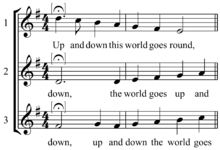
A round (also called a perpetual canon [canon perpetuus], round about or infinite canon) is a musical composition, a limited type of canon, in which multiple voices sing exactly the same melody, but with each voice beginning at different times so that different parts of the melody coincide in the different voices, but nevertheless fit harmoniously together.[2] It is one of the easiest forms of part singing, as only one line of melody need be learned by all singers, and is part of a popular musical tradition. They were particularly favoured in glee clubs, which combined amateur singing with regular drinking.[3] The earliest known rounds date from 12th-century Europe. One characteristic of rounds is that, "there is no fixed ending", in the sense that they may be repeated as many times as possible, although many do have "fixed" endings, often indicated by a fermata.[1]
"Row, Row, Row Your Boat" is a well-known children's round for four voices. Other well-known examples are "Frère Jacques", "Three Blind Mice", "Kookaburra", and, more recently, the outro of "God Only Knows" by The Beach Boys.[4]
A catch is a round in which a phrase that is not apparent in a single line of lyrics emerges when the lyrics are split between the different voices. Rounds that fall into the category of "perpetual canon" feature a melody whose end leads back to the beginning, allowing easy and immediate repetition. Often, "the final cadence is the same as the first measure".[5]
- ^ a b MacDonald & Jaeger 2006, p. 15.
- ^ Johnson 2001.
- ^ Aldrich 1989, Introductory essay, 8–22, especially at p. 21: "Catch-singing is unthinkable without a supply of liquor to hand...".
- ^ Hoffman 1997, p. 40.
- ^ Walton 1974, p. 141.